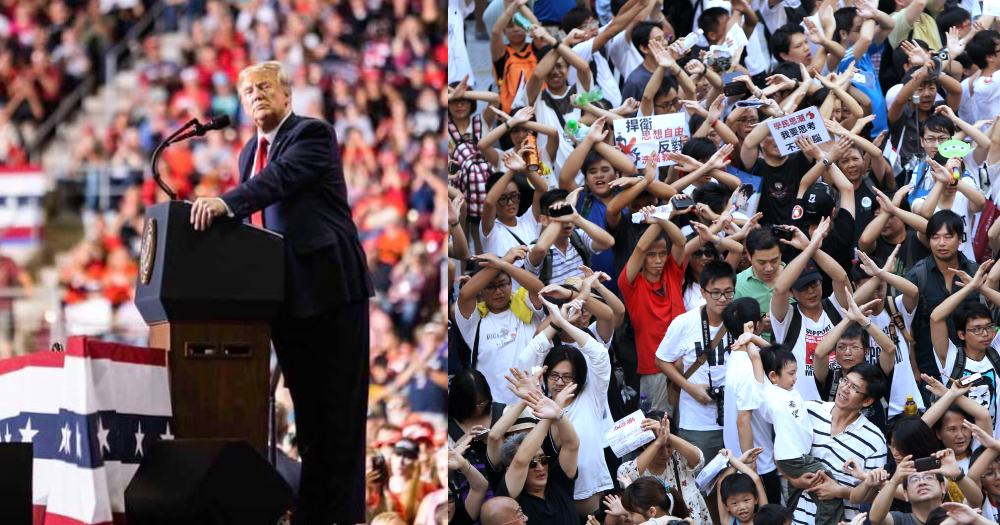Legislation supporting human rights in Hong Kong is gaining momentum in the United States.
Dubbed the United States-Hong Kong Policy Act, the bill would put pressure on China to ease off any plans of a crackdown on pro-democracy protesters by threatening Hong Kong's special trading status with the U.S, should it be passed, according to Bloomberg.
Such an act would see the U.S. conducting annual assessments on whether Hong Kong is sufficiently autonomous from the Chinese government in order to justify it's unique status under U.S. law.
The legislation would also see the U.S. president reporting to congress and imposing sanctions on any individuals found to be responsible for "abducting and torturing" human rights activists.
What is this special trading status?
Under an agreement instituted in the United States-Hong Kong Policy Act, the U.S. has historically treated the city separately from China in terms of trade export and economics, according to The South China Morning Post.
This has been the case since Hong Kong was handed over by the British to China in 1997.
This means that the tariffs the U.S. has slapped on China do not apply to Hong Kong.
And as Hong Kong has served as the re-export hub between the two nations, losing its special trading status with the U.S. would undoubtedly affect the Chinese economy.
Background
Bipartisan support for the bill
Reuters reported that House of Representatives Speaker Nancy Pelosi — alongside Republicans and fellow Democrat representatives — held a news conference on Sep. 18 in support of the "Hong Kong Human Rights and Democracy Act of 2019".
"Democrats and Republicans in the House and the Senate enthusiastically support this legislation", said Pelosi, who added that they stood with "all who are fighting for a peaceful, hopeful future".
Also at the news conference was student leader Joshua Wong, singer-actress Denise Ho, and other Hong Kong activists.
According to The Straits Times, Wong had earlier in the week on Sep. 17 testified at a bipartisan congressional commission about police brutality against protesters and political interference from the mainland.
The bill is expected to pass through both the House of Representatives and the Senate, having received bipartisan support.
No word yet from Trump
However, Bloomberg reports that the Trump administration has yet to disclose whether it would support the bill.
Should the bill pass through Congress as expected, the president would still have to sign-off on it for the proposed laws to come into effect.
It comes at a tricky moment for Trump as his administration is still locked in negotiations to de-escalate the ongoing trade war with China.
According to Bloomberg, Chinese trade officials are scheduled to travel to the U.S. this week ahead of a meeting of senior negotiators in October.
Trump's senior adviser Kellyanne Conway was quoted by Bloomberg as saying that "the president has made very clear that he supports the right of people in Hong Kong to be protesting out in the street for their freedom."
However, Conway said that she had yet to discuss the bill with the president.
Other members of the administration have also remained noncommittal on the White House's stance on the bill.
Reuters reported that the top U.S. diplomat for East Asia, David Stilwell, said at a U.S. Senate Foreign Relations Committee hearing on Sep. 18 that he needed to "take a longer look at the legislation" when asked if the administration would support it.
Affecting the trade war
Beijing itself has previously hit back at the introduction of a bill in the U.S. that sought to halt the sale of tear gas to Hong Kong.
On Sep. 10, Chinese Foreign Ministry’s spokesperson Hua Chunying accused U.S. lawmakers of “beautifying the violent criminal offences as [a] fight for human rights and freedom”, and defaming the Hong Kong police by calling their forbearance and restraint an “overuse of force”.
It can be expected that should the bill pass into law, this would throw yet another spanner in the works of U.S.-China relations and perhaps scupper any resolution to the trade war.
Yet Pelosi has rejected the validity of such concerns.
"We cannot let commercial interests drive our policy," she said.
Top image from Donald Trump's Facebook page, and David Wong via Getty Images
If you like what you read, follow us on Facebook, Instagram, Twitter and Telegram to get the latest updates.
